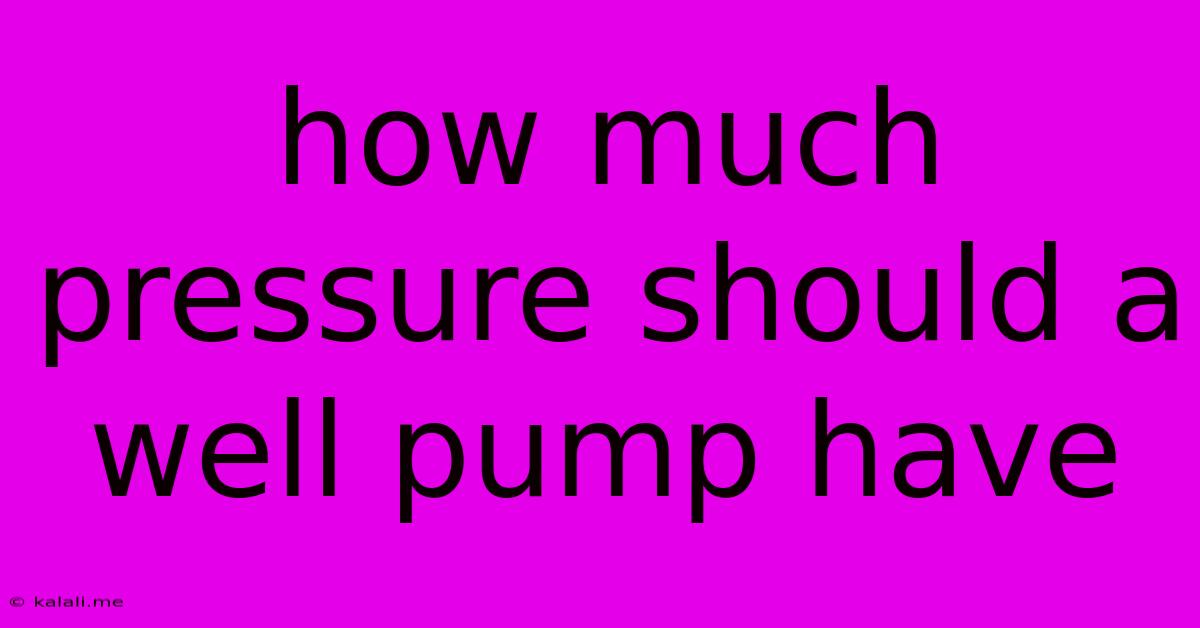How Much Pressure Should A Well Pump Have
Kalali
Jun 02, 2025 · 3 min read

Table of Contents
How Much Pressure Should a Well Pump Have? A Comprehensive Guide
Knowing the ideal pressure for your well pump is crucial for ensuring efficient and reliable water delivery to your home. Too little pressure, and you'll experience weak water flow and low water pressure in your faucets and appliances. Too much pressure can lead to premature pump failure and damage to your plumbing system. This guide will help you understand the optimal well pump pressure, troubleshooting low or high pressure issues, and maintaining your system for peak performance.
Understanding Well Pump Pressure: PSI and GPM
Two key metrics determine your well pump's performance: PSI (pounds per square inch) and GPM (gallons per minute). PSI measures the water pressure, while GPM measures the flow rate. The ideal PSI range typically falls between 40 and 60 PSI, although this can vary slightly depending on your specific well and plumbing system. A lower GPM may indicate insufficient well yield or restrictions within your piping.
Factors Affecting Ideal Well Pump Pressure:
Several factors influence the optimal pressure for your well pump. These include:
- Well Depth: Deeper wells generally require higher pressure to lift water to the surface.
- Water Demand: Households with multiple users or high water consumption appliances (e.g., irrigation systems) will need higher pressure and flow rates.
- Pipe Diameter and Length: Smaller diameter pipes or longer pipe runs increase friction, reducing pressure.
- Altitude: Higher altitudes require more pressure to overcome gravity.
- Pump Type: Different pump types (submersible, jet, etc.) have different pressure capabilities.
Checking Your Well Pump Pressure:
You can easily check your well pump pressure using a pressure gauge. This gauge is usually located near the pump itself or on the pressure tank. Simply turn on a faucet and note the reading on the gauge. Remember, the pressure will fluctuate as you use water. The pressure should recover quickly once the water demand subsides.
Troubleshooting Low Well Pump Pressure:
Low water pressure can stem from various issues:
- Low Water Level in the Well: This is often caused by overuse, drought conditions, or a failing well.
- Clogged Pipes or Filters: Sediment or debris buildup can restrict water flow. Regular cleaning and filter replacement are crucial.
- Faulty Pressure Switch: This component controls the pump's on/off cycle. A malfunctioning switch can cause erratic pressure or failure to start.
- Failing Pump: A worn-out pump may not be able to generate sufficient pressure.
- Leaky Pipes: Leaks in the plumbing system reduce overall water pressure.
Troubleshooting High Well Pump Pressure:
Excessive pressure is equally problematic:
- Faulty Pressure Switch: A faulty switch may not correctly shut off the pump, leading to over-pressurization.
- Incorrect Pressure Tank Settings: The air pressure within the pressure tank needs to be properly adjusted.
- Oversized Pump: A pump that's too powerful for your system can result in excessive pressure.
Maintaining Optimal Well Pump Pressure:
Regular maintenance is key to ensuring optimal well pump pressure and longevity:
- Regular Inspections: Check your pressure gauge regularly to monitor pressure levels.
- Filter Replacement: Replace filters according to the manufacturer's recommendations.
- Pressure Tank Maintenance: Check and adjust the air pressure in your pressure tank annually.
- Professional Service: Schedule professional well pump inspections and service as needed.
Conclusion:
Maintaining the correct well pump pressure is vital for efficient water delivery and the longevity of your system. Understanding the factors affecting pressure, regularly monitoring your system, and addressing issues promptly will help ensure you enjoy reliable and consistent water pressure in your home. Remember that consulting a qualified well pump professional is always recommended if you encounter persistent problems or are unsure about any aspect of your well pump system.
Latest Posts
Latest Posts
-
Failed To Commit Changes To Dconf
Jun 04, 2025
-
How To Use Ferrules And Stops
Jun 04, 2025
-
Can The President Disband The Fbi
Jun 04, 2025
-
How To Fix A Toilet Seat
Jun 04, 2025
-
Cut Off Frequency Of Rc Circuit
Jun 04, 2025
Related Post
Thank you for visiting our website which covers about How Much Pressure Should A Well Pump Have . We hope the information provided has been useful to you. Feel free to contact us if you have any questions or need further assistance. See you next time and don't miss to bookmark.